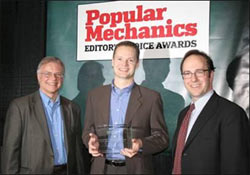I had the chance to ask Mr. Soren Lund, Director of LEGO Group’s MINDSTORMS division (pictured), a few questions about Mindstorms NXT. Here is the first question and his response:
Q: What surprised you most about the new NXT components? By this, I mean are you pleased with the changeover to Technic components and do you feel it will be a more useful and easier to build with than the RCX/Bricks version?
SL: From the beginning of the project, we defined the strategy for the next generation of MINDSTORMS. We wanted to take advantage of the new technologies in the market to make it easier to build and program robots but also to allow for more sophisticated use of our toolset. The Interactive Servo Motor is a good example of this. Because of the feedback loop from the motors to the NXT it is now very easy to make a robot go straight. If one motor is a bit ahead of the other motor then the NXT will tell that motor to wait for the other motor. For the first time user this will happen automatically. For the advanced user you now have a motor that you can control very precisely - down to one degree. The feedback we got from the MUP (MINDSTORMS User Panel) when we showed them the motor was: "Do you know what kind of sophisticated robots we can build when we get that motor?"
It was also very important for us to make it easier to build stable, moving robots. The LEGO TECHNIC building system helps us do that. By staying 100% with the TECHNIC elements it is easier for kids 10 years and up to create their own robots. You will be amazed when you see how easy it is to build the Quick Start model.

Q: What surprised you most about the new NXT components? By this, I mean are you pleased with the changeover to Technic components and do you feel it will be a more useful and easier to build with than the RCX/Bricks version?
SL: From the beginning of the project, we defined the strategy for the next generation of MINDSTORMS. We wanted to take advantage of the new technologies in the market to make it easier to build and program robots but also to allow for more sophisticated use of our toolset. The Interactive Servo Motor is a good example of this. Because of the feedback loop from the motors to the NXT it is now very easy to make a robot go straight. If one motor is a bit ahead of the other motor then the NXT will tell that motor to wait for the other motor. For the first time user this will happen automatically. For the advanced user you now have a motor that you can control very precisely - down to one degree. The feedback we got from the MUP (MINDSTORMS User Panel) when we showed them the motor was: "Do you know what kind of sophisticated robots we can build when we get that motor?"
It was also very important for us to make it easier to build stable, moving robots. The LEGO TECHNIC building system helps us do that. By staying 100% with the TECHNIC elements it is easier for kids 10 years and up to create their own robots. You will be amazed when you see how easy it is to build the Quick Start model.

(Soren Lund, center, Popular Mechanics magazine Editor’s Choice Award)
-----
Many thanks to Mr. Lund for his response. Questions 2 and 3 will be posted soon... so please check back.